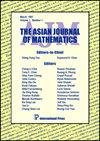一类具有重叠的自相似测度的L^q谱
IF 0.5
4区 数学
Q3 MATHEMATICS
引用次数: 5
摘要
众所周知,被称为多重分形形式的启发式原理,对于有重叠的自相似测度,如康托测度的$3$倍卷积和某些伯努利卷积,不一定成立。本文研究了多重分形理论中的一个重要函数,$L^{q}$-谱$\tau (q)$,对于有限型测度,一类包含这些例子的自相似测度。对应于每个测量,我们在$% L^{q}$-谱上引入了有限多个变体,这些变体自然地来自有限型结构,并且通常比$\tau $更容易理解。我们证明$\tau$总是以这些变量的最小值为界,并且等于$q\geq 0$的最小值。这个特殊的变体符合测度$\mu$的$L^{q}$-谱,它被限制在其支持的适当子集内。如果IFS满足特定的结构属性,这在上面的例子中是成立的,那么$\tau$就被证明是所有$q$的这些变量的最小值。在给定$\mu$局部维数的前提下,证明了$q \ll 0$的最小变量与斜率等于$\mu$局部维数最大值的直线重合。同样,上面的例子也是如此。更一般地说,根据与$\mu $的局部维数密切相关的概念,给出了$\tau$及其变体的边界。本文章由计算机程序翻译,如有差异,请以英文原文为准。
The $L^q$-spectrum for a class of self-similar measures with overlap
It is known that the heuristic principle, referred to as the multifractal formalism, need not hold for self-similar measures with overlap, such as the $3$-fold convolution of the Cantor measure and certain Bernoulli convolutions. In this paper we study an important function in the multifractal theory, the $L^{q}$-spectrum, $\tau (q)$, for measures of finite type, a class of self-similar measures that includes these examples. Corresponding to each measure, we introduce finitely many variants on the $% L^{q}$-spectrum which arise naturally from the finite type structure and are often easier to understand than $\tau $. We show that $\tau$ is always bounded by the minimum of these variants and is equal to the minimum variant for $q\geq 0$. This particular variant coincides with the $L^{q}$-spectrum of the measure $\mu$ restricted to appropriate subsets of its support. If the IFS satisfies particular structural properties, which do hold for the above examples, then $\tau$ is shown to be the minimum of these variants for all $q$. Under certain assumptions on the local dimensions of $\mu$, we prove that the minimum variant for $q \ll 0$ coincides with the straight line having slope equal to the maximum local dimension of $\mu $. Again, this is the case with the examples above. More generally, bounds are given for $\tau$ and its variants in terms of notions closely related to the local dimensions of $\mu $.
求助全文
通过发布文献求助,成功后即可免费获取论文全文。
去求助
来源期刊
CiteScore
1.00
自引率
0.00%
发文量
0
审稿时长
>12 weeks
期刊介绍:
Publishes original research papers and survey articles on all areas of pure mathematics and theoretical applied mathematics.

 求助内容:
求助内容: 应助结果提醒方式:
应助结果提醒方式:


